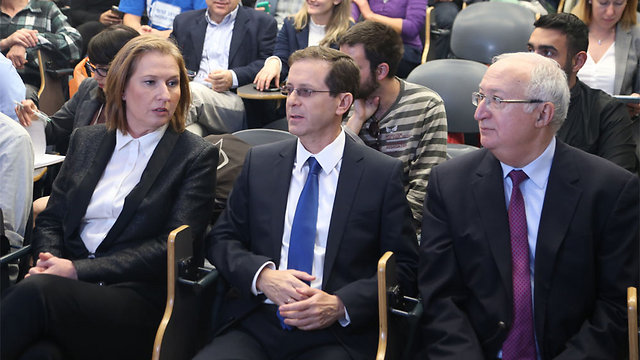
Zionist Camp socioeconomic plan targets schools, hospitals and would-be home owners
Program laid out by Manuel Trajtenberg, the party's finance minister candidate, covers seven key issues and is expected to cost almost NIS 7 billion.
Under the slogan, "The money is going back to the public," the Zionist Camp on Tuesday unveiled its socioeconomic program plan for the country, with a focus on cost of living, health care and education.
"Under my government, the public will sense the change from the first year," Zionist Camp co-leader Isaac Herzog pledged at the press conference at the Academic College of Tel Aviv-Jaffa.
The program, outlined by the party's candidate for finance minister, Prof. Manuel Trajtenberg, covers seven issues – housing, education, health, the cost of living, the elderly, equitable growth and employment – and is expected to cost some NIS 6.9 billion. Under the program, there are no plans to raise taxes in the foreseeable future.

"In the Israel of 2015, young couples can only fantasize about purchasing an apartment," Herzog said. "There are elderly people who are rummaging through garbage cans, and the hospital emergency rooms are grossly overcrowded, with patients on beds in corridors and even at the entrances. Has our situation improved under (Benjamin) Netanyahu's rule? Absolutely not."
And according to Tzipi Livni, Zionist Camp co-leader, "The state doesn't belong to the government but to the public. Following six years of neglect, we will fix it for you. For us, this isn't an election promise but a true commitment. Judge us the day after because we have the wherewithal to live up to it."
Housing – renting from the state for 20 years
Under the Zionist Camp's program, the state will provide land and the contractors will provide the housing. The program also proposes that the state take ownership of apartments that will be set aside for rent for a period of 15-20 years as subsidized housing. Tenants will have the option to purchase the apartment over the years.
Trachtenberg said that the way to lower prices in the housing market was by means of upping the available land inventory. Under the party's program, a senior minister, with authority over the Israel Land Administration and Planning Administration, will be appointed to oversee the housing issue.
ILA land in high-demand areas will be marketed at reduced prices and local authorities will be offered incentives for residential construction, with contractors to be rewarded for adhering to schedules.
The program also offers housing solutions in the Arab, Bedouin and Druze sectors.
Estimated cost: NIS 500 million
Education – more staff, smaller classes, subsidies for afterschool programs
The Zionist Camp's program speaks of an additional teacher's assistant in kindergartens for ages 3-4, and subsidies for afternoon programs for ages 3-9. In addition, construction will begin on educational institutions for ages 0-3.
Trachtenberg said that parents' payments would be reduced and schools would receive budgets in keeping with socio-economic criteria and the needs of the students, and not on a sectorial basis as is the case today. The program also seeks to reduce the number of students in the classes by, inter alia, doing away with the practice of hiring contract teachers.
Estimated cost – NIS 2.1 billion
Health – abolishing private care, less waiting
In light of the collapse of the public health system, the program proposes to abolish the private medical services at public hospitals and provide budgets and incentives for around-the-clock operations and shortening hospital lines, with specialist doctors in attendance throughout the day.
In addition, the country's health maintenance organizations will receive incentives to provide quality health-basket services and thus reduce the need for supplemental and private health insurance. The program also involves tighter regulation of the public and private health system.
Estimated cost – NIS 1.5 billion
The cost of living – boosting competition to reduce prices
Over and above the goal of creating transparency among the banks, the Zionist Camp program speaks of setting up a fund that will invest in bringing new companies into domestic and non-competitive markets.
Under the program, the state will help to set up a nationwide distribution network for small food manufacturers; this will allow them to compete better with the large manufacturers and is expected to significantly reduce prices for the consumer.
Estimated cost NIS 200 million
The elderly – free dental care
The program seeks to up the old-age allowance from the age of 70, and also to simplify the elderly population's dealings with the National Insurance Institute. In addition, the public health basket will be supplemented with treatments aimed at improving the quality of life of the elderly in Israel, including dental care from the age of 75.
Estimated cost – NIS 1 billion
Equitable growth – reduced inequality and better employment terms
The program aims to improve employment terms for workers and reduce inequality among the sectors of the population through investment in all branches of the economy and better functioning of the public sector. This chapter of the program also stresses the need for a political solution that will help to rescue Israel from isolation and thereby boost tourism and increase the chances of attracting foreign investment.
Estimated cost – NIS 2.1 billion
Employment – minimum wage and allowances for single-parent families
The program offers staggered allowances and benefits to single-parent families with the purposes of encouraging single parents to go out to work. It also speaks of stricter enforcement of labor laws, including the issue of minimum wage.
Estimated cost – NIS 420 million










